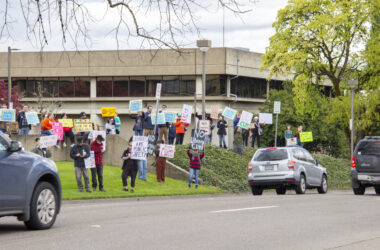
Dogs stand outside of a camp at Cascades Gateway City Park on March 2, 2021. (Amanda Loman/Salem Reporter)
Marion County officials say a bill making its way through the Legislature aimed at decriminalizing homelessness would create more legal headaches for local governments.
House Bill 3115, sponsored by House Speaker Tina Kotek, would move state law in line with the ruling from the 2018 landmark Martin v. Boise. The ruling limited how local governments could regulate homeless camping.
The ruling states that local laws regulating sitting, lying, sleeping or keeping warm and dry outdoors on public property “must be objectively reasonable as to time, place and manner with regards to persons experiencing homelessness.”
Prior to the pandemic, Salem City Council had been considering a “sit-lie” ordinance that would restrict people lying or sitting on public sidewalks during certain hours of the day. Then, Dan Atchison, Salem’s city attorney, said the camping ordinance wasn’t a criminal penalty and wouldn’t be affected by the federal court decision.
In written testimony, all three Marion County commissioners signed a letter that said the bill would bring “undue and unfounded claims against counties and cities.”
If passed, the bill would clear the way for person experiencing homelessness to bring a lawsuit challenging how a city or county regulates people sleeping outside. Lawsuits brought under the law could challenge how “objectively reasonable” the local regulations are. That criteria has sparked concern.
Commissioners, in their testimony, went on to say the bill would place residents at risk by restricting the government’s power to regulate homeless camps and where they can be situated.
“Public safety is one of the main priorities of cities and counties and we must maintain local control when deciding if a homeless camp is acceptable near such places as schools, daycares or local youth center,” the letter dated March 8 read.
Salem City Manager Steve Powers said in testimony the intent of the bill was to make more shelter available in local communities by 2023, the year it would take effect if passed.
But he said the bill is overly broad and unclear on the definition of public property, clarification of the reasonableness standard and who has standing to bring a lawsuit against a local government under the law.
“Without amendments, the bill will require extensive litigation to clarify the scope,” he wrote in a letter dated March 23.
In an email Tuesday, Powers said the amendments that have been proposed don’t address the city’s concerns.
Jimmy Jones, executive director of the Mid-Willamette Valley Community Action Agency, said at the bill is essentially enshrining the federal ruling into state law.
“Unless a locality can answer one simple question, ‘where can they go?’ those policies are doomed to failure, and they always end with unintended consequences, as we saw here in Salem last year,” Jones wrote in testimony.
Jones said if the bill doesn’t pass, it will be more difficult for unhoused people to access federal courts to seek relief if there’s a camping ordinance they consider unjust.
Contact reporter Saphara Harrell at 503-549-6250, [email protected].
Salem Reporter counts on community support to fund vital local journalism. You can help us do more.
SUBSCRIBE: A monthly digital subscription starts at $5 a month.
GIFT: Give someone you know a subscription.
ONE-TIME PAYMENT: Contribute, knowing your support goes towards more local journalism you can trust.









